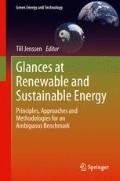Abstract
The following chapter describes the ‘guard rail concept’ developed by the German Advisory Council on Global Change (WBGU) as an example for the threshold principle. First, the main components of the concept and the thresholds will be explained. Based on this, applications of the concept are illustrated with focus on sustainability of bioenergy in `. Finally, a summarizing conclusion on the strength, limitations and weaknesses of the concept with regard to sustainability assessment and operationalization is given.
Access this chapter
Tax calculation will be finalised at checkout
Purchases are for personal use only
References
German Advisory Council on Global Change (WBGU) (1996) Welt im Wandel, Wege zur Lösung globaler Umweltprobleme, Jahresgutachten 1995. Springer Verlag, Berlin
German Advisory Council on Global Change (WBGU) (1999) Welt im Wandel, Strategien zur Bewältigung globaler Umweltrisiken, Jahresgutachten 1998. Springer Verlag, Berlin
Intergovernmental Panel on Climate Change (IPCC) (2007) Climate Change 2007, synthesis report, contribution of working groups I, II and III to the fourth assessment report of the Intergovernmental Panel on Climate Change. In: Pachauri RK, Reisinger A (eds) Core Writing Team. IPCC, Geneva, Switzerland. http://www.ipcc.ch/publications_and_data/publications_ipcc_fourth_assessment_report_synthesis_report.htm. Accessed Dec 2012
German Advisory Council on Global Change (WBGU) (2009) Future bioenergy and sustainable land use. Earthscan, London
German Advisory Council on Global Change (WBGU) (2004). World in transition, towards sustainable energy systems. Earthscan, London
German Advisory Council on Global Change (WBGU) (1995) Scenario for the derivation of global CO2 reduction targets and implementation strategies. In: Statement on the occasion of the first conference of the parties to the framework convention on climate change in Berlin, Bremerhaven
German Advisory Council on Global Change (WBGU) (2006) The future oceans—warming up, rising high, turning sour, Special Report, Berlin
Richardson K. et al (2009) Climate change: global risks, challenges and decisions, synthesis report, Copenhagen, 10–12 March 2009 www.climatecongress.ku.dk. Accessed Dec 2012
Schwertmann U, Vogl W, Kainz M (1987) Bodenerosion durch Wasser. Vorhersage des Abtrags und Bewertung von Gegenmaßnahmen, Stuttgart, Ulmer
Wischmeier WH, Smith DD (1978) Predicting rainfall erosion losses—a guide to conservation planning. Agriculture Handbook No. 537, U.S. Department of Agriculture
Food and Agriculture Organization of the United Nations (FAO) (2006) World agriculture: toward 2030/2050, Interim Report. Prospects for food, nutrition, agriculture and major commodity groups, Rome. http://www.fao.org/docrep/009/a0607e/a0607e00.htm. Accessed Dec 2012
German Advisory Council on Global Change (WBGU) (2009) Kassensturz für den Weltklimavertrag—Der Budgetansatz, Sondergutachten, Berlin
Messner D, Schellnhuber J, Rahmstorf S, Klingenfeld D (2010) The budget approach: a framework for a global transformation toward a low-carbon economy. J Renew Sustain Energy 2, 031003(online publication):14
German Advisory Council on the Environment (SRU) (2012) Environmental Report 2012, responsibility in a finite world, SRU. Berlin
International Solar Energy Society (ISES) (2005) Renewable energy future for the developing world, White Paper, written by D. Holm under contract to the International Solar Energy Society, Freiburg. http://whitepaper.ises.org. Accessed Dec 2012
Fritsche U, Hennenberg K, Huenecke K (2010) The “iLUC Factor” as a means to hedge risks of GHG emissions from indirect land use change. Working Paper, Darmstadt, Öko-Institut
Author information
Authors and Affiliations
Corresponding author
Editor information
Editors and Affiliations
Rights and permissions
Copyright information
© 2013 Springer-Verlag London
About this chapter
Cite this chapter
Härdtlein, M. (2013). Guard Rails for Bioenergy in Developed and Developing Countries. In: Jenssen, T. (eds) Glances at Renewable and Sustainable Energy. Green Energy and Technology. Springer, London. https://doi.org/10.1007/978-1-4471-5137-1_6
Download citation
DOI: https://doi.org/10.1007/978-1-4471-5137-1_6
Published:
Publisher Name: Springer, London
Print ISBN: 978-1-4471-5136-4
Online ISBN: 978-1-4471-5137-1
eBook Packages: EnergyEnergy (R0)

